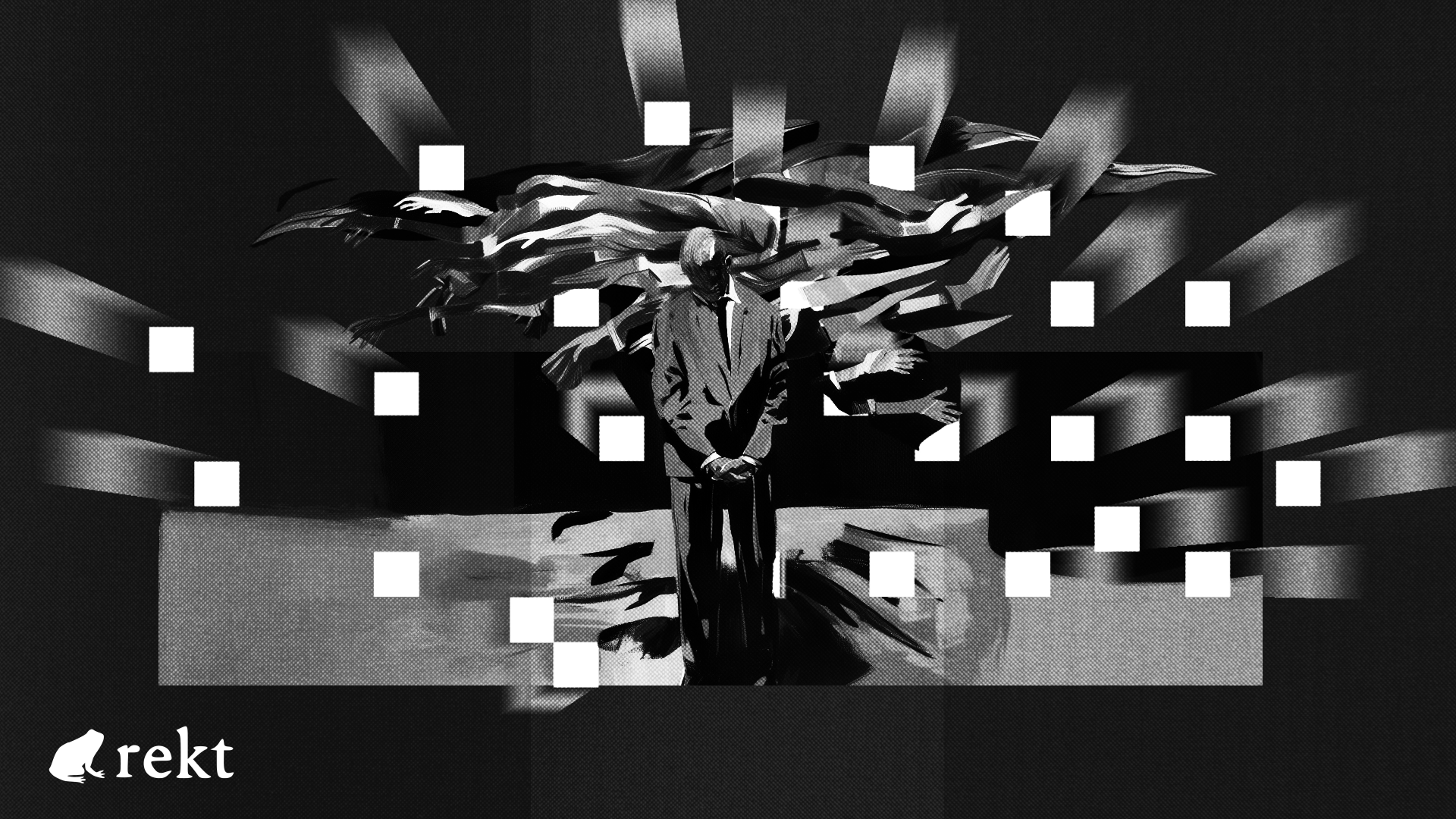Tales from the Chain - Decentralized Deceit

This story's inspiration came from one of our readers, Peter Kacherginsky of Blockthreat newsletter fame. Peter made a request for a technical fictional short story inspired by real incidents.
This challenge has been accepted and the result is a gripping tale that blends fact and fiction, shedding light on the complex world of DeFi exploits.
Rekt.news is open to its community and welcomes any innovative ideas from its readers. Our DMs are always open.

The protocol's funds vanished in the blink of an eye.
One moment, 100 million in staked ETH. The next? Zero. A digital heist for the ages and I orchestrated every byte of it.
As crypto Twitter exploded, Telegram groups and Discord channels erupted in panic,
I leaned back in my chair, a ghost in the machine, watching chaos unfold across a dozen my screens.
My fingers danced over keys, erasing the last traces of my presence from the blockchain.
Execute smart contract. Verify output. Funnel funds. Erase traces. Simple. Elegant. Devastating.
I wasn't always the villain of this story.
Once, I was the white knight of Web3, a blockchain security researcher exposing vulnerabilities and strengthening protocols.
I set out to be the guardian of the digital frontier, a beacon of security in the Wild West of Web3.
But when NewDawn stole my work and branded me a fraud, they didn't just take my code, they shattered my ideals.
In my quest for vindication, I've become the very thing I once fought against.
When righteousness turns to retribution, even the noblest warrior can transform into a rogue.
My transformation from protector to destroyer serves as a stark warning, illustrating how idealism can be crushed against the unforgiving realities of greed and betrayal.
As the line between hero and villain blurs with each transaction, who are the real good guys – those who follow the rules of a rigged game or those who break them to expose the truth?

The Betrayal
It began eight months ago. I'd discovered a critical flaw in their smart contract architecture.
The vulnerability lay in their cross-chain bridge implementation, a notoriously tricky component that had been the downfall of many DeFi projects before.
Their bridge relied on a multi-sig wallet for validation, but the threshold for signature verification was dangerously low.
My audit report was meticulous, the exploit proof-of-concept alarming yet undeniable.
I reached out privately, following responsible disclosure protocols. I even offered to help patch the vulnerability, excited at the prospect of strengthening a promising project.
Their response? Two weeks of radio silence, followed by a surprise protocol upgrade incorporating my fixes, without credit or compensation.
When I went public, their PR machine painted me as an attention-seeking hack.
Crypto Twitter, that fickle beast, turned on me overnight.
But the blockchain has no juries, only executioners. And I had just appointed myself both judge and executioner.

The Exploit
NewDawn's fatal flaw wasn't in their code, it was hubris.
Their new Proof-of-Stake system and optimistic rollup layer-2 solution promised unparalleled security. Reality begged to differ.
I began my redemption arc with an innocuous deployment: a flash loan contract interfacing with their liquidity pools.
On the surface, a simple DeFi primitive. Beneath, a silent predator.
As transactions flowed, I pieced together the puzzle – gas patterns, state changes, contract call orders. The optimistic rollup's fraud proof system was solid.
But their price oracle implementation? A glaring weakness hiding in plain sight.
Their rush to launch left gaps. The oracle relied too heavily on a single, manipulatable price feed.
Amateur hour for a protocol of their size, but a goldmine for someone with my skills.
I spent weeks crafting a series of transactions like a grandmaster plotting checkmate.
The opening gambit: a set of legitimate deposits and trades to build up a history of normal activity.
I deployed dozens of wallets, each one slowly accumulating a position in the protocol.
The middlegame was a byzantine dance of contract interactions, each one probing, testing, laying groundwork.
I exploited the complexity of their DeFi ecosystem – lending protocols, yield aggregators, and synthetic asset platforms.
Each transaction was a thread in an elaborate tapestry, meaningless in isolation but devastating when pulled together.
Then came the endgame – a lightning-fast series of flash loans and nested contract calls.
The key was in the sequencing. First, a massive flash loan to amplify the attack's impact. Then, I exploited the critical flaw in their price oracle.
By executing a series of large-volume trades on illiquid trading pairs, I created a temporary but significant price discrepancy.
The coup de grâce came in the form of a specially crafted transaction that took advantage of the manipulated price feed.
In a matter of seconds, I was able to borrow against grossly overvalued collateral, siphoning out 100 million in crypto from the lending pools, leaving worthless assets in my wake.
What happened next was a marvel of unintended consequences.

The Aftermath
The sudden liquidity crunch triggered a cascade of liquidations across the DeFi ecosystem. Lending protocols, DEXs, and yield farms all felt the shock waves.
I watched in awe as the stolen funds ricocheted through the blockchain.
Stablecoins swapped for privacy tokens, funneled through decentralized exchanges, split and recombined through dozens of wallets.
By the time I routed it all into Tornado Cash forks and layer-2 bridges, the trail was hopelessly obfuscated.
Alarms blared. NewDawn's Telegram channels and Twitter exploded with panic. Their tech leads scrambled, frantically trying to pause contracts and freeze assets.
But in the world of smart contracts, there are no take backs. Code is law and today, I was judge, jury and executioner.
As I basked in the digital carnage, an encrypted message pinged on a channel I hadn't used in months.
"Impressive work. Poetic justice, some might say. But you've painted a target on your back. They're coming for you. All of them."
The message was signed with a key I recognized – one of the few allies I'd retained after my fall from grace.
A prominent hardware wallet developer, known for their uncompromising stance on privacy.
I smirked, closing my command console. Let them come. In this new world of decentralized finance, code isn't just law.
It's the language of power and I've just proven my fluency.
Redemption
Who am I? I'm the vanguard of the revolution they never saw coming.
NewDawn thought they could steal my work and destroy my reputation. Instead, they created their own nemesis.
As I started transferring funds to a series of hardware wallets – a fortune in cold, hard crypto – I couldn't help but laugh.
NewDawn's marketing team had always been fond of grandiose slogans. "Ushering in a new era of decentralized finance," they'd proudly proclaimed.
Well, they weren't wrong. But every new dawn casts new shadows.
This heist wasn't just revenge, it was a declaration of war.
A clarion call to every coder, every hacker, every disillusioned idealist who'd been chewed up and spit out by the very revolution they helped create.
The blockchain isn't just a ledger anymore. It's a battlefield and I've just fired the first shot in a war that will reshape the very foundations of the digital economy.
They thought they could centralize power in a decentralized world. They were wrong.
I am the bug in their system, the glitch in their matrix, the chaos in their order and I'm just getting started.
Watch closely, NewDawn. Your empire of code is about to meet its sunset.
The future isn't written in ones and zeros anymore. It's etched in the scars of the betrayed, coded in the fury of the forsaken.
As the lines of code become battle lines, who truly holds the power – the architects of the system, or those who can break it?

REKT serves as a public platform for anonymous authors, we take no responsibility for the views or content hosted on REKT.
donate (ETH / ERC20): 0x3C5c2F4bCeC51a36494682f91Dbc6cA7c63B514C
disclaimer:
REKT is not responsible or liable in any manner for any Content posted on our Website or in connection with our Services, whether posted or caused by ANON Author of our Website, or by REKT. Although we provide rules for Anon Author conduct and postings, we do not control and are not responsible for what Anon Author post, transmit or share on our Website or Services, and are not responsible for any offensive, inappropriate, obscene, unlawful or otherwise objectionable content you may encounter on our Website or Services. REKT is not responsible for the conduct, whether online or offline, of any user of our Website or Services.
